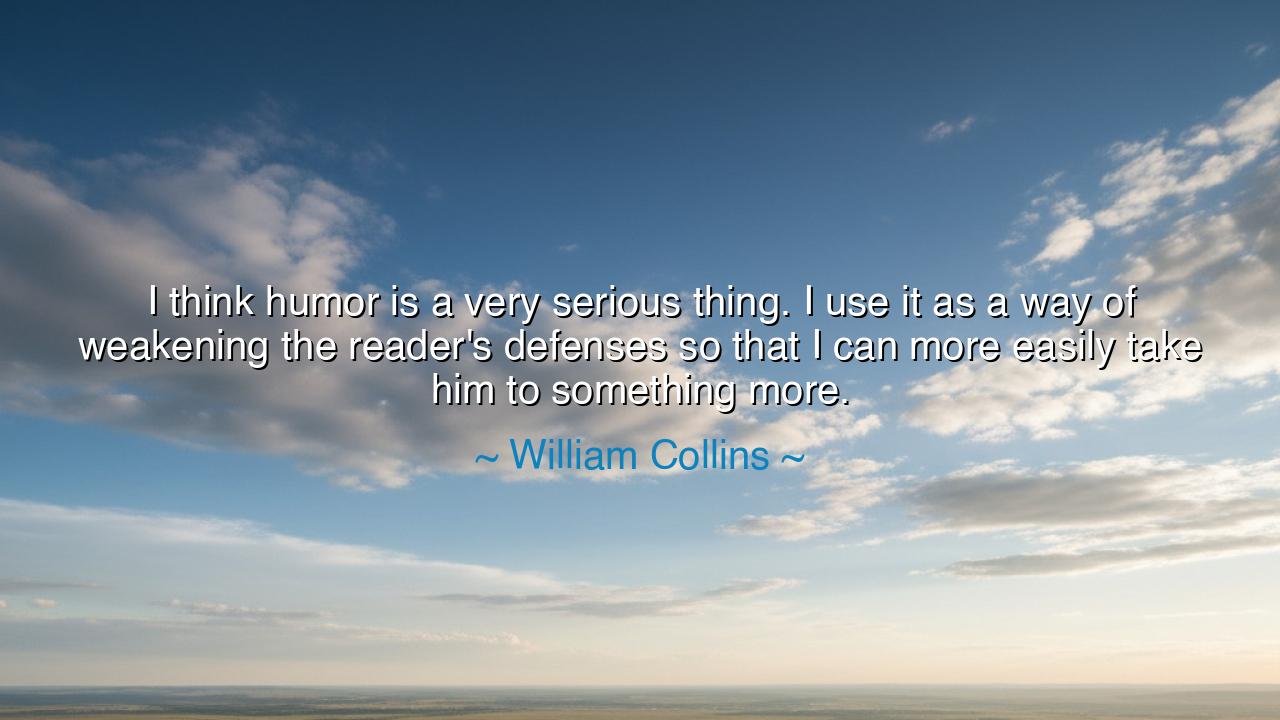
I think humor is a very serious thing. I use it as a way of
I think humor is a very serious thing. I use it as a way of weakening the reader's defenses so that I can more easily take him to something more.






The poet and thinker William Collins once said: “I think humor is a very serious thing. I use it as a way of weakening the reader’s defenses so that I can more easily take him to something more.” In this statement, he reveals the ancient and paradoxical truth that humor and wisdom are not enemies, but allies — that laughter, when wielded by the wise, becomes a key that unlocks the guarded heart. Collins does not treat humor as trivial amusement, but as a sacred tool — a means of reaching into the soul. He reminds us that those who can make others laugh hold the power not only to entertain, but to transform.
When Collins says humor is “a very serious thing,” he speaks of its hidden gravity. Laughter seems light, but it carries depth. It disarms pride, dissolves tension, and lowers the walls that people build around their convictions and fears. Once laughter softens those barriers, truth can enter — gentle, unexpected, irresistible. The wisest teachers, prophets, and storytellers have always known this secret. They understood that one can speak hard truths wrapped in laughter, truths that would be rejected if delivered in anger or solemnity. Thus, humor becomes not escape from seriousness, but its most subtle servant.
In the ancient world, Socrates himself was known to use humor in his dialogues. Though remembered as a philosopher, he was also a master of irony — a humor that revealed ignorance by pretending ignorance. When he asked questions with a smile, men felt clever answering them; only later did they realize he had led them to doubt everything they thought they knew. His laughter was never mockery, but enlightenment disguised as jest. So too did Collins, in his poetry and thought, employ humor not to diminish his subjects, but to lift them higher — to lead the reader from the shallow comfort of laughter to the deeper quiet of reflection.
There is a sacred craft in this approach. To “weaken the reader’s defenses,” as Collins says, is not to deceive, but to open. For the heart, when unguarded, can receive what the mind alone resists. Humor melts fear; it turns solemn truths into gifts instead of burdens. Consider, for example, the power of a parable or a fable — the fool who teaches wisdom through folly, the clown who reveals the flaws of kings. Shakespeare, too, knew this art. His jesters — Feste, the Fool, and Touchstone — were not mere comedians; they were philosophers clothed in laughter. They spoke truth to power under the cover of wit, showing that humor is the safe vessel of dangerous wisdom.
In this way, humor is an act of mercy. It allows the bearer of truth to approach the listener without force. The angry teacher shouts and is ignored; the joyful one jokes and is remembered. When people laugh, they open themselves — they surrender for a moment their armor of seriousness, and in that moment, the truth may touch them. Collins understood this not as manipulation, but as compassion. The writer or speaker who uses humor does not seek to dominate the listener, but to invite them into understanding. It is the same principle that the healers of old knew: a bitter medicine must be given with sweetness if the soul is to receive it.
There is a deeper paradox here. Humor, while light in tone, can lead to the heaviest truths. It can carry grief, mortality, or moral revelation with grace. The laughter of the wise is never empty; it is the echo of understanding. In times of darkness, when fear and pride cloud judgment, humor becomes a lantern — its glow soft but steady, leading people safely toward truth they would otherwise reject. As Collins suggests, humor is not distraction but bridge: a passage from laughter to awareness, from mirth to meaning.
The lesson in Collins’s words is profound: to teach, to lead, or to heal others, one must first learn to disarm them with kindness. Use humor not as a weapon, but as a gift — not to belittle, but to elevate. When you speak truth, let it come with warmth and wit; let your laughter carry wisdom instead of scorn. Those who can make others laugh can also make them listen, and those who can make them listen can change the world.
So remember, my friends: laughter is the doorway to the soul, and those who walk through it gently can plant seeds of truth that no argument could ever force. As William Collins teaches, humor is not a retreat from seriousness — it is the most noble path toward it. Laugh not to escape life, but to embrace it more deeply. For once laughter has opened the heart, wisdom may enter — and where wisdom enters, the soul is never the same again.






AAdministratorAdministrator
Welcome, honored guests. Please leave a comment, we will respond soon